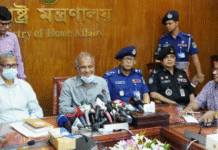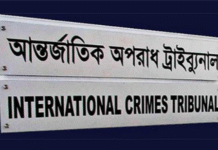
“If you come close to me you will smell the pus.”
This was the first statement by Ahmed Kabir Kishore to this correspondent. He was released from Kashimpur Central Jail-2, on bail, around 12:20pm — mere hours back. The cartoonist had spent 10 months in prison for the crime of drawing cartoons, prosecuted under the Digital Security Act.
Kishore turned his head to show an oozing ear canal, before rolling up his jeans to show numerous scars on his leg. The scar tissue shone mottled, scaly and white against his wiry dark legs. The 10 months in prison has rendered him absolutely skeletal, his glassy eyes sunk deep.
“The jailer took photos of my legs, the day before yesterday. The inspector general of prisons also met me and told me, ‘You will get out in two days, please get your ear treated outside’,” narrated Kishore.
“I had asked the prison doctor on many occasions to take me outside for medical treatment, but I was told that detainees cannot be taken out at the moment,” he said. “I was prescribed antibiotics and painkillers but that did not work.”
“I was picked up on May 2. It was an hour before iftar. I was taking a nap when I was woken up by loud knocking. When I opened the door, around 17 men in plain clothes barged in. Four of them had small arms on them,” said Kishore.
Point to be noted here — the first information report filed by Rab-3 claims that Kishore was picked up from his Kakrail home around 2:30am on May 5, which is a direct contradiction of Kishore’s statement.
The FIR states that Kishore was arrested by Rab-3 in the early hours of May 5, and produced in court on May 6, which is in line with detention laws that only allow for 24 hours of detention before it is mandatory to produce an arrestee in front of a magistrate. However, Kishore’s claim alleges a period of arbitrary detention of at least 60 hours before his “official” time of arrest.
When asked about this time discrepancy, Rapid Action Battalion’s media and legal wing director Lt Col Ashiq Billah said there was no violation. “He was produced in court during the time period specified by law. An aggrieved person can say anything he wants to.”
Furthermore, Kishore alleged that it could not be ascertained whether the people who picked him up belonged to any law enforcement agency because they were in plain clothes.
“When I asked them for their identities, they just scolded me for making them wait. One person said his name is Jashim,” said Kishore. “They ordered me to change out of my lungi and wear pants, and put on a clean shirt. When I asked why I would do that, Jashim replied, ‘Just do what I tell you to do’.”
Kishore’s lawyer Barrister Jyotirmoy Barua stated that law enforcement had no legal right to enter Kishore’s house without a warrant or without showing their identification. “If they wanted to arrest him under section 54, certain strict conditions have to be met pertaining to his detention, which were not followed.”
“We were in the room which had all my art supplies and computer hardware. Jashim was smoking a cigarette and he put it out on the floor. I asked him not to do that, and bent down to pick up the stub from the floor, when I saw a man take out a bag of red pills and a gun and try to plant it on my stack of books,” described Kishore.
“That is when I started yelling. I held the hand of the person. He shook me off. I told him that you cannot do this to me and I asked them if they had a warrant,” said Kishore. “Seeing that I was yelling, Jashim signalled the men to back off. He asked me to get out too, but I refused because I was afraid they would plant more things.”
That is when they hauled him out. He saw that his entire house was turned upside down. “When I asked the reason, they just said, ‘I will tell you the reason when we get into the car’,” narrated Kishore.
“When I came outside, I saw that they brought two strangers and made them sign a made-up seizure list. That is when they put a monkey cap over my head that completely covered my face up to my neck,” said Kishore. “I was cuffed before being taken into the car, on the staircase.”
Right before his head was shrouded in the monkey cap, Kishore noticed a line of six vehicles in front of his home. “The car right in front of me was a grey V6. There were two of these. There was a car with a licence plate that said ‘Dhaka-Metro Sho-1812’ or something like that. There was a Nissan Patrol. All the vehicles had tinted windows,” described Kishore.
“My face was covered before I was put into a car so I don’t know which vehicle I was in, but it was probably the grey V6,” he said.
He did not know who was taking him, and where he was being taken, and every time he asked, they kept saying that they will let him know everything if he cooperates. “If you help us, I will help you,” was what they told him, Kishore said.
“Once inside the car they turned on music and yanked the volume to the maximum. They were playing some very loud Hindi music followed by SD Rubel’s music. It seemed like they were playing music so that if I scream, nobody can hear me,” said Kishore.
He said the journey took around 40 minutes.
“I counted the minutes meticulously. They did not beat me inside the car, but when I kept asking why I was arrested, they just said ‘Don’t talk so much’,” he added.
In between, the car stopped at a place and the men stood on the road and ate iftar. “I realised I could lift up the cap using the two index fingers of my handcuffed hands, and when the car stopped, I lifted only enough to be able to see through the rim,” said Kishore.
He said the place where they stopped had a mechanical roadblock. As the men ate, Kishore took a few minutes to gauge his captors.
“There was a house and a person got out of the house and went into a car — I did not see his face but I saw his shoes. He was wearing moccasins. There was a person sitting in the seat in front of me. In his hand he had a cell phone and I caught a glimpse of the screen — there was a map of some sort and a black text box with numbers. He kept moving the numbers around his screen with his fingers,” said Kishore.
After iftar, the car resumed its journey again. “When the car stopped, I was told to get out. I tripped and stumbled and fell down, and it was then that they shoved and dragged me. I was dragged into a room, still blindfolded,” narrated Kishore.
He felt his way around the room and found three plastic chairs. “The floor was tiled, but it felt old, scuffed, damp and slimy. There was an air-conditioned room nearby, because as I was brought into this room, I felt a blast of cold air coming from somewhere. A person came in — he took my hands, which were cuffed in front of me, and cuffed them behind my back,” said Kishore.
He kept begging for food, saying that he is diabetic and cannot go long periods without eating, but nobody responded.
“After a long while, they took me into another room — it was a long walk from the room where I was being kept. They sat me down on a hard chair. There were things attached on the handles and the legs of the chair. They opened my blindfold and said in English, ‘If you look back, you will be killed’,” Kishore narrated, adding that he could sense about 10-12 people.
“They pulled down a projector screen and put up a cartoon. It was a cartoon I had drawn depicting mother nature stitching the clothes of different countries. They asked me: ‘Who did you draw? Did you draw the prime minister?’.
“I said I did not and that this was a conceptual cartoon about nature healing the world during the pandemic,” said Kishore.
Kishore said they showed him one cartoon after another and asked about the characters he drew — they asked regarding all of the female characters if they were the PM, and regarding all the male characters if they were the Father of the Nation.
“I got mad and asked, Bangabandhu has a mark on his face, does this cartoon have one? They then hit me on the leg with a thick stick with a steel knob on the tip. There were four sticks displayed in the front to hit me with,” he said.
Kishore lashed back and said they don’t understand cartoons.
“A person got up, and slammed both sides of my head with his palms.”
Kishore felt a searing pain shoot through his left ear — that is when his ear drum burst, he said.
The interrogation went on for a while, and each time Kishore fought back and refused to give in to their line of questioning, he was hit. “They hit me at the back of the head because my cap was up.”
He was hit on the back, on his legs, behind his head.
“They asked me for the passwords of my email and social media accounts. But by then I was not hearing anything in my right ear, which was bleeding. So, they had to write out the instructions for me, and I responded in writing,” he said.
They continued interrogating him about the “I Am Bangladeshi” Facebook page, which used to share his posts, and asked him about how he knew Swedish-Bangladeshi journalist Tasneem Khalil, Hungary-based businessman Saer Zulkarnain, and Germany-based blogger Asif Mohiuddin. They also repeatedly interrogated him about a prominent businessman who had featured in one of his cartoons.
In addition, Kishore said that he was interrogated about radical extremists and about whether he was involved in the blogger killings.
“I said that my friends were the ones being attacked and killed,” he said.
“I was in the room for between four and five hours. I heard the azaan once, and there was a strong smell of petrol which made me sneeze. There was also a lot of noise from cars,” he said.
At one point, Kishore told them that he needed to go to the bathroom, or that he would soil his clothes. “The bathroom was not smelly or dirty but there was a lot of blood on the floor. I was still blindfolded, but I saw from beneath the edge of my blindfold,” said Kishore.
He requested that the blindfold be removed while he uses the toilet, but his captor prodded his back with a stick and ordered him to walk up front and urinate.
After a while, he was sent back to the first room.
“I was in a lot of pain and blood was pouring out my nose and ears, but I was determined to not stay in there. I even stood up and opened the door, but two people came up and said they would kill me if I move. They told me they had not done anything to me yet.”
In the early hours of the morning, a person with a crew cut came into his room and gave him stale pulao and meat to eat.
A few hours later he was taken back into the interrogation room, and round after round of questioning and torture continued.
“I lost sense of time and days. I was only fed twice — the first one was the spoilt pulao and the second was a packet of something, but there was so much pain in my mouth that I could not eat,” said Kishore.
At one point, during evening time, Kishore said his captors took him to Rab-3’s office in Khilgaon.
“The minute they took my blindfolds off, cameras started flashing. That’s when I saw Mushtaq [Ahmed, the writer who died in custody on February 25]. He said, ‘Be proud man! You have not done any crime!’
“Mushtaq was smelling strongly of urine. He too had been picked up a few days ago, and had been beaten a lot. He was electrocuted in the genitals. There were newspapers on the floor and I asked Mushtaq to use that to clean himself. He took off his underwear and threw it away — I saw that it had excrement in it. He had defecated in his pants from the torture, he told me,” said Kishore.
An assistant superintendent came to question them.
“I asked to go to a bathroom, but requested a clean bathroom… and the officer took me to their personal bathroom. The officer told someone to clean the blood from the ear. I was also given biscuits and tea once,” said Kishore.
The duo was taken to Ramna Police Station at dawn. “The duty officer asked me if I was tortured, and I wanted to say yes, but Mushtaq stopped me, saying that we could not tell the truth, or we would be tortured more,” said Kishore.
Hours later, they were taken to the court and thus began their 10-month ordeal in prison.
“Mushtaq and I were in different prisons, different cells. I only saw him on February 23. I got to know about Mushtaq’s death from another inmate who got the newspaper. He saw the news of Mushtaq’s death,” said Kishore.
And it was at that point when the man, who had up until then been describing the horrifying torture that was inflicted upon him with an impassive, defiant face, broke down in tears at the mere mention of Mushtaq.
“I am having to hear that it is because he died that I am free. I did not want freedom like this. Mushtaq told me ‘let’s get out, get fit and go see Mt Everest’. We were supposed to get out together,” he wept.
On March 4, Kishore’s lawyer Barua appealed to the court of Metropolitan Magistrate Mohammad Jashim to accept a complaint against the Rab members under the Torture and Custodial Death (Prevention) Act, 2013.










